
Last weekend I spoke to a woman, a therapist by profession, about Proposition 106, the “assisted suicide” bill before Colorado voters this November. She remarked that until we have experienced their pain and suffering we cannot say with certainty what we ourselves would do or if it is moral or immoral. I told her she was thinking about the issue the wrong way around. We determine the morality of an action before we are in the situation so that should such experiences occur we may stand firm in our conviction. In other words, we need to count the cost first.
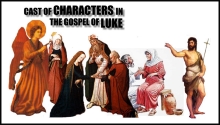
An “Introduction” is defined as information provided to the reader to prepare them for the main body of the work (ibid.). It may include background information (though not preliminary information) that helps readers understand what led up to the beginning of the first chapter of the main work. This may include references to previous works by the same author that is relevant to the main body. There can be no denial that the bulk of the Gospel of Luke describes the three-year ministry of Jesus. With this being the focus, it makes sense that all material proceeding the beginning of Jesus’ ministry is introductory in nature.

In the early centuries following Jesus there were secret societies called Mystery Religions. Like something out of a Dan Brown novel, they met in ancient temples and their initiation rites and path to renewal were closely guarded secrets. Their beliefs were often centered on the cycle of the seasons, or of life itself woven into the fabric of myth of gods or goddesses that lead to a mystical experience centering on the emotional satisfaction of its members. What many don’t know is that Jesus too had a secret, knowledge that only his closest followers were privy to.
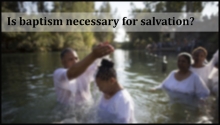
Last week I happened upon a church in my neighborhood and looked upon their statement of faith. At first everything seemed in keeping with sound theology, until near the end when I found this statement: “Baptism saves! Contrary to popular belief, baptism is part of salvation.” Once I was over my initial shock that anyone would want to add anything to the gospel I asked a simple question, “which baptism?” The answer I received was not surprising, but it may be enlightening for some to explain why I asked the question. There are, in fact, seven different baptisms mentioned in the Bible.
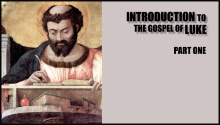
The births of John the Baptist and Jesus occurred under the rule of Herod the Great. It is commonly accepted that his reign extended from 37 BC until his death in 4 BC. The date of his death is fixed to a solar eclipse that occurred that year (ancient historian Josephus tells us Herod died the same year as the eclipse). Recently some scholars have decided the true date should be affixed to a partial eclipse occurring in 1 BC, meaning the birth of Jesus would be closer to the date suggested by map makers of old. There is no way of determining this exactly unless or until other documentation is unearthed. Either way, the birth of John and Jesus occurred near the end of the pre-Common Era.

There are many ways to outline a book, the most common for books of the Bible are either by scene (subject) or by literary devices that clue the reader into divisions within the text. For example, the book of Acts could be divided into two parts, the account of Peter and the account of Paul, with subdivisions beneath them. Or you could divide the text into parts based upon “Progress Reports” Luke includes about the church, and then subdivided from each of those sections. The former suggestion is based on subject matter while the latter is based on literary cues.

“Ishrat no more. My friend Ishrat was brutally tortured and killed by terrorists in a Dhaka restaurant yesterday… Most of the Muslim Bangladeshis were spared after they identified themselves and recited limes from the Koran. Ishrat, who was not wearing a Hijab and neither wanted to prove herself, was hacked to death with a machete. Twenty other foreign hostages were also hacked to death with sharp weapons by Islamist terrorists during a dramatic siege at an upmarket Dhaka restaurant that ended in a bloodbath… The majority of the victims were from Italy and Japan.” – Aloke Kumar, July 2, 2016

If you are a Christian who has taken the time to read the Bible and do at least a little digging into theology, then you probably love to debate. One of the most often debated topics in Bible schools across the globe is that of Calvinism vs. Arminianism, or more specifically a subset of those two theologies around the notion of Eternal Security. For some, once you have placed your trust in Jesus your eternal fate is sealed, and for others it is merely a decision that can be reversed later. There are problems on both sides of the debate.

Today we complete our look at the main players in the introduction of Luke’s gospel.
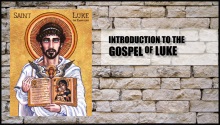
This marks the start of a prolonged series on the Gospel of Luke. As we’ve already examined the book of Acts, it seems reasonable that the first Gospel we study should be Luke as both share a common author. Ask anyone to compare the gospels and two facts will almost always be mentioned: (1) that John is the Gospel of Love, and (2) that Luke is the Historical Gospel. While it is true that John gives us a look into Jesus’ personal struggles and relates stories not contained in any other gospel account, it is not true that Luke is purely a historical account.

Charis Christian Center is a church and ministry located in Colorado Springs, Colorado. For years they have paid the city’s Mountain Metro Transit (MMT), the city-run bus system around town, thousands to advertise on bus benches. Their first campaigns boldly proclaimed in large letters “Celebrate Jesus” and “Experience Jesus”, and its current ad states “Jesus is Lord.” But this encouraging tribute to our Lord may be ending on July 10, 2016 as the Metro City Transit has ordered the ministry to remove Jesus from their advertising message. Reportedly the authority has received only a single complaint about the signs.
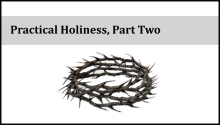
Given the analogy that Jesus uses, that he is the vine, his Father is the gardener, and we are the branches, it seems clear that the mystery of “remaining in” means to keep connected to God. This is something we have talked about frequently at Think-Biblically.com, building connections with God. In this case, however, we can discern a very specific way to build a connection, perseverance. “Remaining in” implies connection, but simply “remaining” involves persevering. Therefore, we are to persevere in our relationship with God to abide in him.
